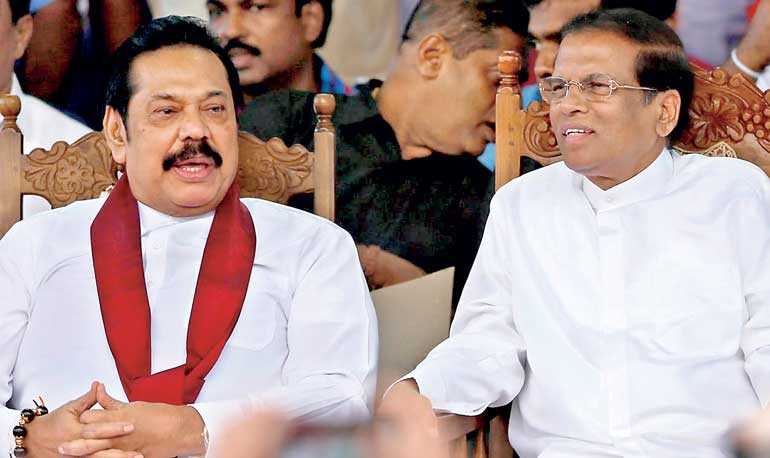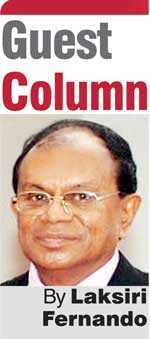Saturday Feb 28, 2026
Saturday Feb 28, 2026
Monday, 12 November 2018 00:00 - - {{hitsCtrl.values.hits}}

FILE PHOTO: Ousted Prime Minister Ranil Wickremesinghe reacts during a press conference in Colombo, 27 October – REUTERS
Have you heard about the Orange Book Liberal, Nick Clegg? He is in our Constitution, rather distortedly, stealthily crept in through the 19th Amendment in Article 70. Luckily, most strange (or orange) theories are still in Ranil Wickremesinghe’s (Ranil Wickremesinghe) head, not in the Constitution.
Can you remember he (Ranil Wickremesinghe) touted the idea of an Executive Prime Minister system in the late 1990’s? He did that based on the system in Israel at that time (1992-2003), but then Israel themselves changed the idea, after disastrous results. Nevertheless, he continued with the idea and tried his best to implant some of the elements through the 19th Amendment.
Ranil Wickremesinghe says that the “Constitution doesn’t make provisions for personal prejudices”, an insinuation aimed at Maithripala Sirisena. He only wants the Constitution to work for his personal interests.
Ranil Wickremesinghe’s Hindu interview 
The recent evidence of these strange orange theories is in the interview Ranil Wickremesinghe gave The Hindu correspondent, Meera Srinivasan on 8 November. Following is the key paragraph from the report.
“Wickremesinghe, who has pegged his chances entirely to a floor test, has ruled out a court appeal on the matter, citing the Parliament’s ‘supreme judicial powers’. Reiterating the position, he said: “Even if you go to court, they will send you back to Parliament on this matter. We are different from yours [Indian context]”.”
According to Ranil Wickremesinghe, “we are different to the Indian democracy”, not because of Sri Lanka’s Presidential system, but because of his imaginary ‘Parliamentary supremacy’ and subordination of the Judiciary to it. Parliamentary supremacy was there in the 1972 Constitution, yet subordinated to the sovereignty of the people, but not in the 1978 Constitution, even after the 19th Amendment.
There is nothing particularly wrong in pegging his or any other’s political chances entirely on the floor test, but if he wanted to question or challenge the constitutionality of his dismissal, he should have appeared before the Supreme Court.
Ranil Wickremesinghe and his supporters, also in the ‘civil society’ sector, are obviously expressing an understandable political disappointment or despair on the Prime Minister’s dismissal by the President. But, that is not a constitutional argument. According to Articles 125 of the Constitution, “The Supreme Court shall have sole and exclusive jurisdiction to hear and determine any question relating to the interpretation of the Constitution…” That is the right place to go without creating instability and chaos.
This is the matter that Ranil Wickremesinghe shied away from during his ‘The Hindu’ interview, lamely saying “we are different from yours”. That is not true. In respect to the interpretation of the Constitution, the role of the Judiciary, and the importance and independence of the Judiciary, we are the same as India. Ranil Wickremesinghe or his supporters cannot snatch the judicial powers from the Supreme Court saying “we are different”.
He has taken matters onto himself (a lawyer, of course), also saying “Even if you go to court, they will send you back to Parliament”. How does he know? Why does he hesitate? Why not test? Why create instability, chaos, and violence in the country instead?
Role of the Speaker
There are other strange and untested constitutional theories that have been put forward by several sections of society regarding the ‘role of the Speaker’ and related matters. First, they objected to the President’s dismissal of Ranil Wickremesinghe. Then they started lamenting about his prorogation of Parliament as unconstitutional, the accusation which had no basis at all, although one could claim it is not ideally democratic.
But, what was most strange and even purely unconstitutional was to ask the Speaker to ‘convene Parliament forthwith’, although the President was also asked to revoke the prorogation forthwith. This was there in the so-called statement by ‘Professionals on Constitutional and Political Crisis’ (CT, 2 November). These people are apparently not independent. Some of them are paid employees and legal advisors to Ranil Wickremesinghe. Some others have financial stakes in the former Government’s projects.
The origin of the idea that the Speaker has power (over President) in respect to convening Parliament is basically Ranil Wickremesinghe’s orange theory. This is what ‘The Hindu’ reported: “‘The Parliament’s power is supreme and that is what the Speaker has upheld,’ he [Ranil Wickremesinghe] said, referring to Speaker Karu Jayasuriya’s statement on Monday.”
It is on this theory that the Speaker attempted to convene Parliament on 7 November, but failed. Testing this possibility, he also issued a strong statement on 5 November, the main unconstitutional or controversial elements of the statement are as follows.
“It is my duty as Speaker to summon Parliament by 7 November and restore stability in the country. I consider it as the duty of the President, too, to extend his support to me towards this end.”
It is very clear that he was trying to take over the powers of convening Parliament from the President, based on Ranil Wickremesinghe’s theory that Parliament is supreme. This is what the so-called professionals, also quite unprofessionally, asked the Speaker to do. In his statement, the Speaker also tried to assert the power ‘to restore stability in the country’, which is clearly the President’s task. He also asked the President to extend support to him, quite arrogantly.
Arab Spring?
It appears that these people were or are attempting an ‘Arab Spring’ in Sri Lanka. They failed once on 7 November because the Secretary-General of Parliament or other public servants did not want to heed the unconstitutional orders of the Speaker. They also didn’t have the people’s support. The proposers or the instigators themselves were hesitant.
They might attempt it again. It is well known that Arab Spring was a disastrous process of regime change through violence and extra-constitutional means supported by certain sections of the ‘international community’. Various statements and activities by some western countries are quite suspicious under these circumstances. The ultimate aim of Arab Springs appeared to be to destabilise the developing countries in the Middle East and North Africa, but also attempted elsewhere to achieve the same objectives.
The Speaker’s statement on 5 November has major constitutional implications. Other than trying to convene Parliament on his own, he was also trying to determine who the Prime Minister is on his own. This, again, is Ranil Wickremesinghe’s orange theory that he had picked from several neoliberals in Britain (Nick Clegg, David Laws, Edward Davey, etc.). They are almost non-existent in British politics today. The Speaker’s following statement is quite unwarranted and in defiance of the President.
“I wish to emphasise that I am compelled to accept the status that existed previously (Ranil Wickremesinghe as PM) until such time that they (UNP) and the new political alliance (Sirisena and Rajapaksa) prove their majority in Parliament,” he said.
Nick Clegg and Article 70
Given the uncertain political situation in Parliament after the collapse of the National (Unity) Government, and the subsequent volatile situation in the country, the advisability of going directly before the people has been proposed and discussed by many people. I myself suggested that it might be the best option available (‘Evolving Disaster: Agreeing to call for election might be the best option’, Daily FT, 6 November). Because people are the supreme and sovereign, and an election could defuse the uncertain situation.
Again, the dissolution of Parliament is a matter for the President under our Constitution. However, then you confront Article 70, which says the following.
“(1) The President may by proclamation summon, prorogue and dissolve Parliament, provided that the President shall not dissolve Parliament until the expiration of a period of not less than four years and six months from the date appointed for its first meeting, unless Parliament requests the President to do so by a resolution passed by not less than two-thirds of the whole number of Members (including those not present), voting in its favour.”
What is the connection between this Article 70 and Nick Clegg? With due respect to him, he was the person, when he was Deputy Prime Minister of the UK, who proposed and got through the ‘Fixed-term Parliaments Act 2011’, same as Article 70. Of course, he is not responsible for the Sri Lankan folly, unless someone in the UK advised Ranil Wickremesinghe to include it in the 19th Amendment.
What is wrong with this article, or the fixed term? In my opinion, it is not suitable for a country like Sri Lanka, which should have more flexibility given the country’s still evolving democracy. In the case of UK, it was introduced after some discussion and study. In the case of Sri Lanka, it was done arbitrarily and stealthily. The Fixed Term Act in the UK attempted to prevent a PM trying to arbitrarily dissolve Parliament, by advising the Queen to do so. But in the case of Sri Lanka, Ranil Wickremesinghe tried to prevent the President dissolving Parliament, without his or party’s advice. Or perhaps it was just an imitation of whatever our former Colonial masters were doing!
There is a clear flimsy character for the way the 19th Amendment was formulated and the way the economic policies and other policy matters were handled by Ranil Wickremesinghe and his clique. It is completely wrong for the President to talk about ‘butterflies’ if he meant the LGBT community. However, there was definitely a flimsy character for whatever Ranil Wickremesinghe and his clique were doing. The correct word would have been not ‘Samanala’ but ‘Sarwapithala’ to mean flimsy or bogus.
Conclusion
The 19th Amendment is one of the clearest root causes of the present crisis. Many aspects (not all) were based on some flimsy theories and premises. Although Ranil Wickremesinghe has argued that personal prejudices have no place in the Constitution, his personal interests have been built into the system. The attempts to install Presidential powers to the Prime Minister has failed.
Even in respect of independent commissions, while there is some progress from the 18th Amendment, the attempt was made to keep a political hegemony of the ruling party in the Constitutional Council. The Constitutional Council is not the appropriate title and it is not at all about the Constitution.
Most alarming are the contractions, ‘cut and paste’, the failures in doing so, and disparities created between the Sinhala, the Tamil and the English versions. The current controversies or different interpretations about the President’s powers to dismiss a Prime Minister are also largely due to these fundamental weaknesses of the 19th Amendment, apart from political biases. Let me conclude this article by highlighting the contradictions on the matter of the dissolution of Parliament. Whatever is said in Article 70 in respect to the fixed term of the Parliament, Article 33 (2) unequivocally says:
“In addition to the powers, duties and functions expressly conferred or imposed on or assigned to the President by the Constitution or other written law, the President shall have the power, (a) to make the Statement of Government Policy in Parliament at the commencement of each session of Parliament; (b) to preside at ceremonial sittings of Parliament; (c) to summon, prorogue and dissolve Parliament; …”
What a contradiction between the two! The power “to summon, prorogue and dissolve Parliament” here is quite unequivocal, whatever the views, opinions or ‘despair’ you and I have on the situation. One may argue that while Article 70 is applicable under normal circumstances, Article 33 (2) is imperative under special circumstances or crisis situations.